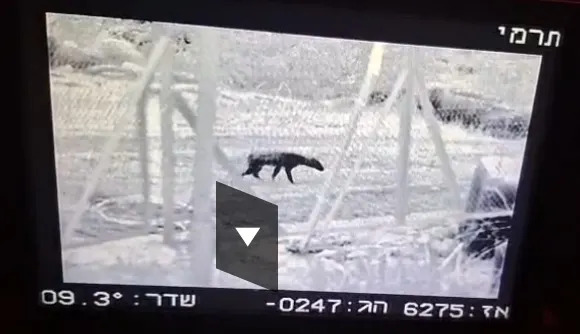Our Terms & Conditions | Our Privacy Policy
Experts thrilled as trail cameras capture footage of feisty creature in showdown with larger animal: ‘An extremely rare observation’
Wildlife experts documented the first sighting of a honey badger on Mount Dov in Israel’s Hermon region in August, reported Israel National News.
The documentation shows that modern conservation technology, when paired with dedicated monitoring efforts, can uncover positive developments in species recovery and encourage future wildlife protection initiatives.
The footage shows one of Israel’s scarcest mammals displaying its famously bold temperament. The animal faced down a much larger jackal species and stood its ground with its tail in a defensive position while vocalizing aggressively, sounds that soldiers in the vicinity later reported hearing.
This discovery brings hope for a species that has disappeared from most of its former territory across the country. Years of conflict with beekeepers who considered them pests led to widespread population decline.
The small carnivore has remarkable defensive abilities. Strong claws and jaws make it an effective hunter. Glands that produce offensive odors protect it from larger predators.
Camera traps like the one used here give scientists data about animal populations without disturbing their natural behaviors. These monitoring tools help researchers track recovery efforts and understand how species adapt to environmental changes.
Wildlife documentation helps experts make informed decisions about habitat protection and species management. When predator populations remain healthy, they control prey species that might otherwise damage crops or spread disease to humans.
Balanced ecosystems with varied predator populations support agricultural stability. Natural pest control from wild carnivores reduces the need for chemical interventions on farms, benefiting both food production and human health.
Apex predators’ presence means the ecosystem has become more resilient. Their return to historical ranges means environmental conditions are improving, and that benefits all species, including the humans who depend on healthy landscapes for clean water and fertile soil.
“This sighting marks an extremely rare observation of a species now considered severely endangered in Israel, although it is considered common in other regions of the world,” researchers noted about the discovery.
Join our free newsletter for good news and useful tips, and don’t miss this cool list of easy ways to help yourself while helping the planet.
Images are for reference only.Images and contents gathered automatic from google or 3rd party sources.All rights on the images and contents are with their legal original owners.



Comments are closed.